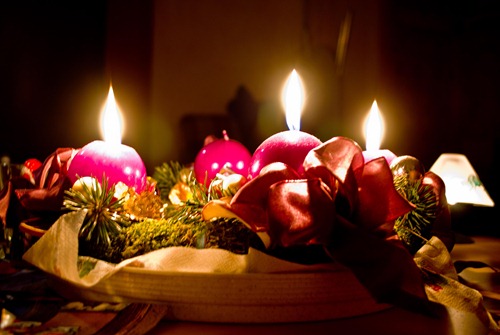An old sermon (4+ years ago??) from my curacy at St Helena's, Boerne, probably a little too long, overdone, and/or redundant, with some good images nevertheless to which I return in my own prayers each Advent.
The awkwardness of teenage years is too inevitable to regret. Which would have been good news if I hadn’t found it out so late. But what a waste, as I look back, what an unnecessary burden of emotion, tears, and self-ridicule in the learning of that lesson. Things just don’t come easy in that adolescent cave. They didn’t for my folks and they didn’t for me. Those who remember adolescence fondly, well you are the special cases. Conflict is the norm, and the nature of that growth.
But somehow I expected to be different. Or at least, I couldn’t wrap my mind around the struggle. For example, I couldn’t for the life of me have told you why every outside comment felt like the critique of my whole being. I couldn’t have understood myself why the words I offered back came out the hurtful ways they did. Looking back, it was all so regrettable, except that it was so equally inevitable. The necessary and natural next-step on the way to growing up.
I remember one particularly regrettable day: my brother and I had spent the whole morning at war; fighting and climbing and otherwise monkeying our way through the house. Finally, my parents, fed up, had enough. In plain words, Dad told us to take our show on the road, to get out of the house, lest our next round of fisticuffs bloody the floor, he explained. Indignant, and in a rare display of solidarity, Matthew and I stormed out the front door, together, hollering as we went, “We’ll be back.”
To which my dad deadpanned behind us, “Is that a promise or a threat?”
And as I think about the gospel read this morning, it calls to life that adolescent mood. Enter John, the scolding parent, prattling on about repentance, good fruit, and viper broods. Hollering to God’s children that they could as easily be rocks; that is, that they can easily be replaced. Imagine anger, the insecurity, and the venom. There’s a heritage to account for after all: a last name that makes them family. But John’s words sting against the whole history of the people called Israel. “What about Moses? What about Exodus? What about wilderness, exile, deliverance? What about Abraham? What about the promise of God made to us?” Still John continues, his rant undeterred: “Even now the axe is laid to the root of the trees; every tree therefore that does not bear good fruit is cut down and thrown into the fire.”
A gasp! Fire? Would he destroy us? Nonsense! The rulers of Israel seethe, their anger burning back toward John. With all of the Old Testament noise of fire and brimstone--of God’s wrath made real--John’s fire comes to their ears as the blinding exclamation point of God, the parent’s fed-up “GET OUT” to God’s children in rebellion.
Except, and this is important, John doesn’t say, “Get out.” He stops himself short.
Instead, the merely regrettable becomes the inevitable with these sober words from John, “Get ready,” he says. “Get ready--fire’s coming.”
“I baptize you,” John says, “with water for repentance, but he who is coming after me is mightier than I, whose sandals I am not worthy to carry; he will baptize you with the Holy Spirit and with fire. Here me Israel, the fire’s coming.”
The One to whom John points, the Messiah, the Son of the Living God, the One baptized with a dove overhead and the thunder of God all around, this One is coming. He is coming like fire.
You and I, from the other side of Jesus’ coming, you and I are where we are, you and I are who we are--as the Church--on account of this holy fire: this baptism; God living among us. What Israel first heard as threat, we now live as God’s promise. After all, if we have any place in the story of Israel, it is as the rocks from which God makes and names his new children.
For this reason, it can be easy, I think, to read the gospel today with a sort of “stinks to be them” smile on our face. How embarrassing for them. Those Pharisees. Those Sadducees. Those snakes. Tsk. Tsk. Thank God for God’s grace, for our welcome; thank God for His fire; but to be honest, it’s all a little hard to take too seriously, at least from this side of the smoke.
After all, we have the Reformation to tell us that we can be confident in salvation through Jesus. As Christians, we do not fear the fires of hell, and while our smugness makes us nervous, we feel that Christ compels us to be smug: our faith is rightfully in Him. Jesus, we pray, delivers us from God’s judgment.
But to think in this way, to somehow see Jesus as water to douse the fires of judgment, this is to miss John’s point this morning: GOD IS THE FIRE! John doesn’t threaten the fires of hell, he promises the fire of God! And so fire is not the avoidable consequence of a life gone awry; instead, fire is the reality of God born in our midst.
Last week, we baptized a child in this font, and immediately afterwards many of us congratulated the family of the baptized. Had we thought much longer about it, though, we might have exclaimed--just as rightly--“Good Lord, what have we done?” The answer of course would have been, “We’ve thrown him to the Fire.”
Let us make no mistake, the waters of baptism are dangerous waters; they are Spirit-drenched waters; the waters of baptism are fire waters of God--waters soaked through with the presence of God. The final words of the baptism drive home the terror and finality of this moment: “You are sealed by the Holy Spirit in baptism, and marked as Christ’s own forever.”
And so John’s words to his vipers are no less meant for us: He asks, “For what do you come to these waters? Only know that the One that you seek will not leave you unchanged. The fire water of God will not allow for disparity. But when your lips touch the coal, the very fire of God, when you drink of the Spirit, the fire will burn holiness in you. Should you allow it--should you desire it--the fire of God will be the birth of God’s will living in you; the death of violence and all self-deception, the explosion of a new creation in Jesus.”
As the Christian preacher and story teller George MacDonald reminds us,
“It is not that the fire will burn us if we do not worship thus; but that the fire will burn us until we worship thus; yea, will go on burning within us after all that is foreign to it has yielded its force, no longer with pain and consuming, but as the highest consciousness of life, the presence of God.”
All of which is why Christians don’t just run up to Christmas. We take our time. We prepare. We wait. We walk up to the fire. Fire is coming. In the meantime, we look at ourselves and we say, “What thing--what distraction--what obstacle--what vice--what defect--would I ask the fire of the living God to melt away in me?” “How is my life set at odds with the heritage I’m so eager to claim?” “God help me,” we say, “to be more truly me. God help me,” we pray, “to abide more deeply with you.” We ask: “What about me and my living twists my relationship with God into lies?” Advent reminds us that Christmas is a transforming gift to be prayerfully approached; a gift to be received with the expectation of new life--even yours and mine.
The reception of God’s gift is repentance in us. It is the turning of our whole lives toward the promise of God. It is the attending of our lives to the Life of God made man. And as we take our steps toward Mary’s baby, this divine gift of God, we find ourselves made closer to one another, too. Like Israel, we find ourselves made a new people:
At the nine o’clock service, just before we read the gospel, the gospel is walked into the middle of the congregation. And our instinct is to turn toward it. To look at it. To orient ourselves around it. So doing, turned around that book, we become a certain kind of people. In that Gospel moment, we become the people who have Jesus at their center. Advent-like, we turn toward the Word; we prepare to receive the gift of God’s Word with us.
Together, we walk toward the fire.
And as we approach the fire that is the baby’s birth--Jesus, God with us--as we draw nearer, we bear glimpses of the holiness of God. We reflect--if so slightly--the glory of the One we pursue.
And this is God’s delight. God gives us His child, that we would become His children. That we might rest in His peace and know the end of rebellion. That we would know ourselves--every inch of ourselves--cleansed by fire, and reconciled to God.
So walk toward the fire. Grab hands as you draw nearer the heat. You who would be the People of God, come to see the Son of God; come to be changed by the life that He gives. And though we don’t necessarily know what we’re doing; though we fear the inadequacy of all that we are; though we know that this fire will consume us completely, may we pray with our being the only words that make sense:
Come, Lord Jesus, come.
Amen.













